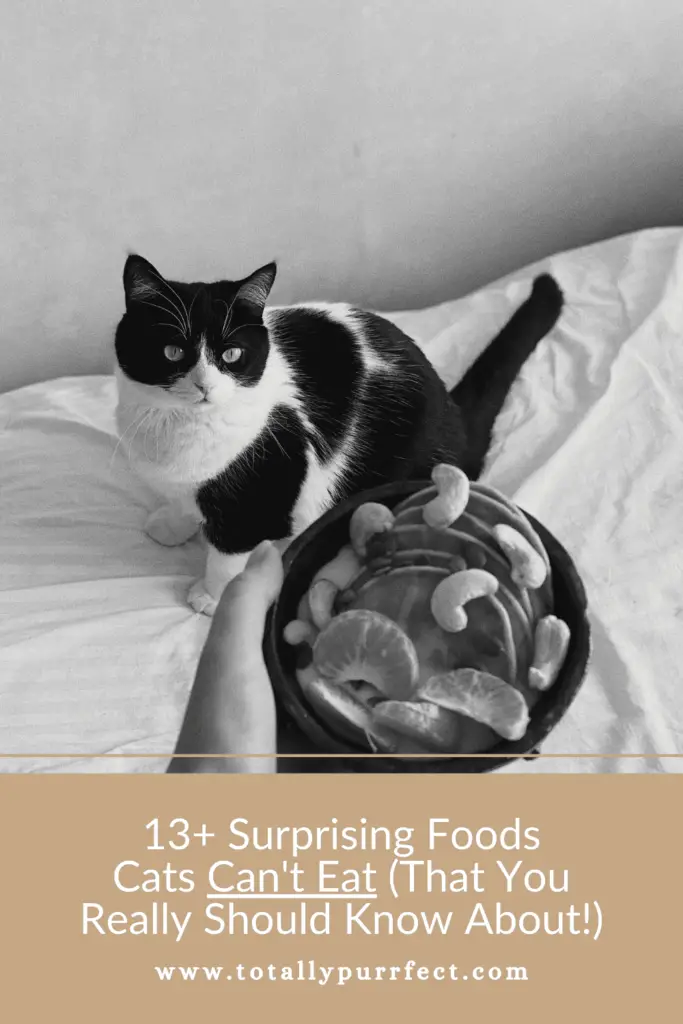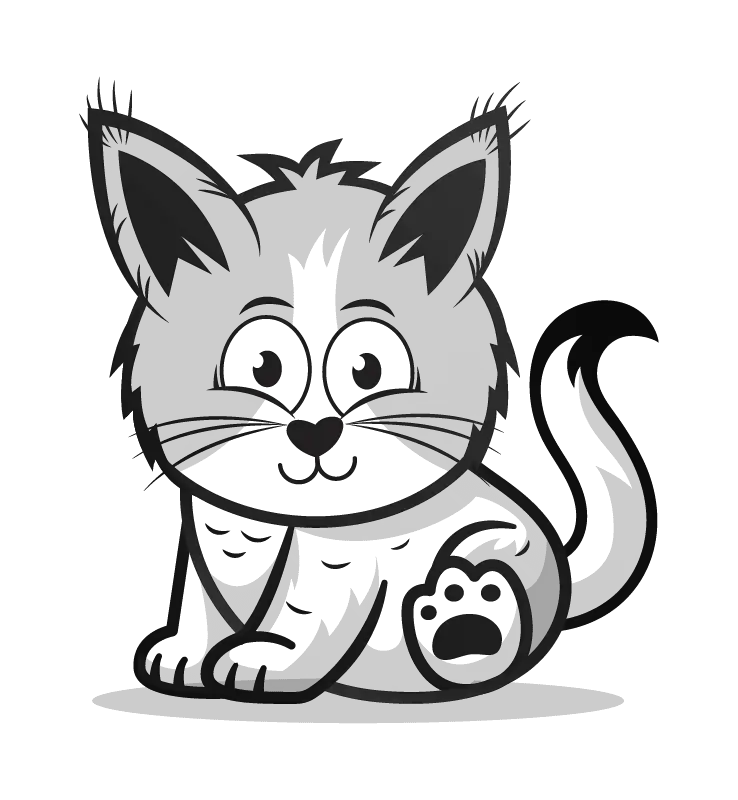Wondering what things cats can eat, and what things cats can’t eat? Plus of course what foods are poisonous to cats? Want to make sure you’re not putting your cat in danger (without even knowing it!)? Then here’s 13+ foods cats can’t eat… which you should really know about!
See, there’s some things that are no-brainers… Things you wouldn’t even THINK to let your cat have! However, there’s other foods that you may think “won’t do any harm”, but actually – they will.
In our opinion, it’s better to be “safe than sorry”, so the best thing you can think is – “If it’s something I would eat – it’s not for my furry friend!” If you want to make your house cat-safe, as an extra precaution, you should also:
- Always store foods out of your cat’s reach; away in cupboards/fridge is best.
- Never leave left over scraps/leftovers of food from meals out. It’s too much of a temptation!
- Don’t let your cat on the counter while you’re cooking or eating. (I know, this is a tricky one. Here’s How To Stop Cats From Jumping On Counters, as a guide to help you with that.)
- Do not feed your cat table scraps – no matter how cute they look when they’re scrounging.
- Consider not just your home, but also your garden. I mean, you wouldn’t keep a snail as a pet, as if your furry friend ate one, it would increase their risk of contracting lungworm. So consider not only how you can keep them safe from the foods they can’t eat indoors, but also protect them when they’re outdoors, too. (By maybe training them to walk on a leash, and ‘supervising’ outdoor time, perhaps.)
- If you think your cat has eaten anything off this list – contact your vet immediately. (They can give you tablets to help your cat get the food out of their system, plus advise as to whether they need them or what to expect from here.)
13+ (Surprising!) Foods Cats Can’t Eat
So, in no particular order, here’s 13+ foods cats can’t eat – which you may not have been aware of.
Remember – this list is extensive, but not complete, so if you’re not sure whether your cat can or can’t have it – presume it’s a big “no – they can’t!”
That way, you have the best chance of keeping them happy, healthy and safe!
1) Raw Meat
Now you may think that cats can eat raw meat… Especially if you have an outdoor cat that goes out hunting, grabbing the odd mouse or bird for itself as well! But when they do this – they tend to eat it straight away.
Over time, raw meat can contain both bacteria viruses, micro-organisms etc that cause disease and parasites.
Freezing kills the parasites (which is why most raw meat you can buy for pets, is frozen), however pathogens (the organisms that cause diseases) can still survive, which is why – if you are buying raw meat – it’s vitally important that it is commercially produced by registered manufacturers.
This way you can ensure safe production techniques; thus reducing the chance of harmful bacteria and potential diseases.
On a similar note, then comes the question of: “Can my cat eat raw meat that I’d buy for myself?” Well again, you have to be careful with this as retail meats for human consumption can be contaminated with pathogens. We usually cook these off, but cats – of course – won’t do this, when eating raw.
So in summary – you have to be careful when feeding raw meat to cats. Some is okay. But some is certainly NOT okay for cats to eat. So always do your research into the safety and credibility of raw meat before feeding it to your cat.
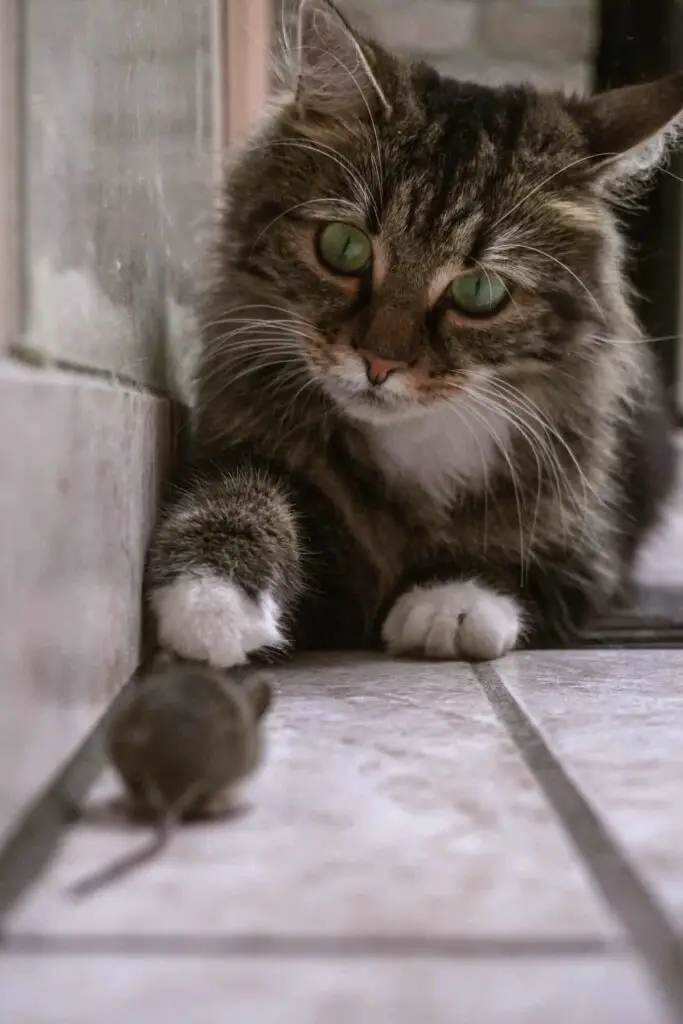
2) Raw Fish
This then leads us to raw fish and – surprisingly – raw fish is a food cats can’t eat (for sure!)
See, cats should NEVER be given raw fish as it will cause severe health problems. Raw fish contains an enzyme called thiaminase that destroys thiamine (an essential B vitamin.)
Vitamin B is crucial to maintain many metabolic processes within your cats body, and deficiencies in this can cause difficulties with balance and even create seizures and depression that can lead to coma.
Raw fish is also a breeding ground for poisonous bacteria such as E.coli and salmonella. On a similar note…
3) Raw Eggs
Raw eggs are another thing cats can’t eat, due to the presence of bacteria like Salmonella and E. Coli.
This can be just as bad for your cat as they are for humans, leading to things like: vomiting, diarrhea, and lethargy. Raw eggs also contain an enzyme that can lead to skin and coat problems.
For this reason – eggs are only safe when cooked and handled properly. When they are cooked, they then add immense VALUE to your cats diet and nutrition.
See, aside from being rich in protein, eggs are also a great source of linoleic acid, Vitamin B2 and B12 and water-soluble Vitamin A – all of which are wonderful for your cat’s skin and coat.
So in summary – eggs are good; raw eggs are not. Raw eggs are one of the foods cats can’t eat, but once cooked- they’re perfectly fine!
4) Bones
Next up, we’ve got bones, and bones are a definite “no no” when it comes to what to feed your cat.
See, bones can damage your cats teeth. They’re also a choking hazard; not to mention the fact that they can splinter, causing potentially fatal internal damage or blockage inside their digestive tract. (Scary stuff!)
Bones are therefore something to avoid – especially if you’re not around to supervise. And if your cat does manage to grab one out of a bin – grab it back fast. It’s really not worth the worry or risk.
Please note: bones can be an useful element of a cat’s diet and they are nutritional in the fact that they’re high in protein. But (and this is a big but!), they’re best broken down, and properly added into foods…
Your cat sat munching on a bone (like a dog would) is not a good idea… Unless you buy specific cat bones that are designed for them, and can watch them like a hawk, every minute!
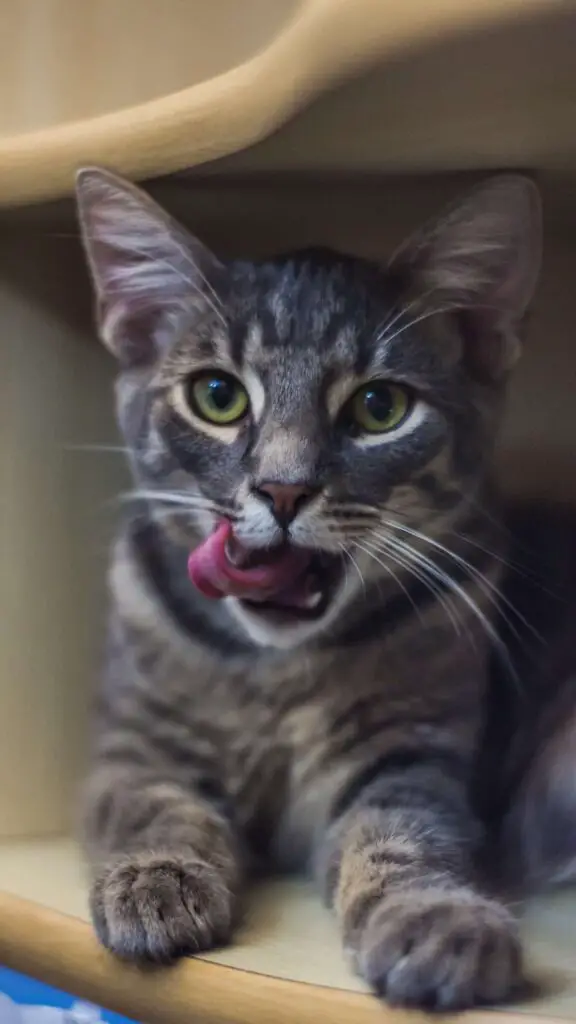
Foods Cats Shouldn’t Eat a Lot Of
Whilst we’re on the topic of misconceptions, let’s just clarify a couple of foods that cats CAN eat, but CAN’T eat too much of. For example, we’ve got things like:
5) Salmon
As mentioned, raw fish is one of the foods can’t eat, so the same applies with salmon. You should therefore only ever give your cat salmon if it’s cooked properly and even then – this should be given as an occasional treat; but not in excess.
Why? Well, too much fish over a long period of time can lead to mercury poisoning in cats, so although salmon can be a popular cat food choice – IT MUST BE FED IN MODERATION!
To gage this better – salmon should be less than 15% of your cat’s total diet. Giving your cat salmon about once a week should be safe. No more than two or three times in a week is advised.
6) Sardines / Pilchards
Next up, we’ve got sardines / pilchards and these are a tricky one as:
- On the one hand, sardines contain minerals like calcium, iron, and copper, which are vital for healthy functioning of a cat’s organs. They’re also packed full of omega-3 fatty acids like DHA and EPA may help improve brain health and cognitive functioning, as well as helping to build stronger bones and healthier joints.
- HOWEVER: EPA and DHA, like most nutrients, provide wonderful health benefits but only in small amounts. They are detrimental in excess amounts or without sufficient antioxidant protection. So if you are feeding them to your cat – feed no more than a 1/4 to maximum 1/2 (of a 3.75-oz can) per week.
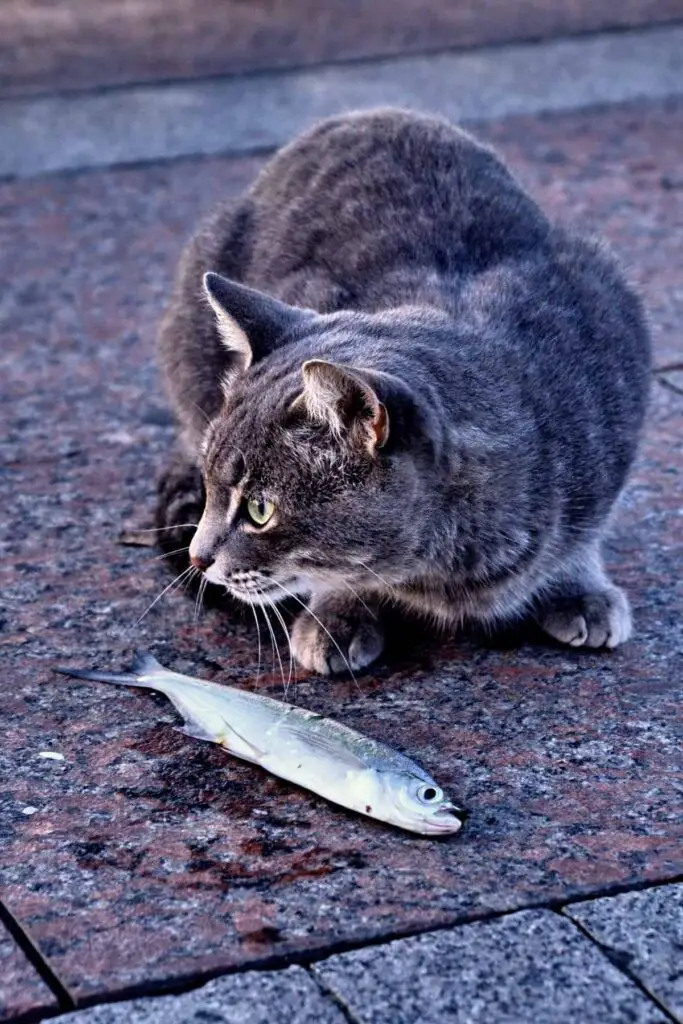
Foods Cats Can’t Eat
Going back to the foods cats can’t eat at all, here’s one you’re likely to be surprised by…
7) Tuna
Making a tuna sandwich for yourself? Think that you can give your cat some left-over’s from the tin? Then think again!
Tuna is not nutritionally balanced and contains high mercury levels, which means it should never be given as part of a cats meal plan and even giving it to your cat as a treat, can cause health issues, especially if given regularly or in large amounts.
8) Dog Food
Dog food also falls into the things cats can’t eat, which makes sense, right? But it’s worth clarifying.
See, you might think it wouldn’t make too much difference, but cat and dog food have different nutritional components. Cats cannot thrive on dog food for many reasons:
- It lacks sufficient vitamin A and taurine, two nutrients cats need to live healthy lives.
- It is also deficient in arachidonic acid, which is an essential fatty acid that’s vital for the production of energy.
- Furthermore, it lacks the adequate meat-protein levels that cats need.
If you fed a cat purely on dog food for a long period, it would be detrimental. The consequences would include things like: a weakened hearts (dilatated cardiomyopathy), loss of vision and digestion problems…
Which of course, you really don’t want to put your cat through. For this reason, you need to make sure you don’t mix up those all important food packets, if you have both cats and dogs! Talking of dogs…
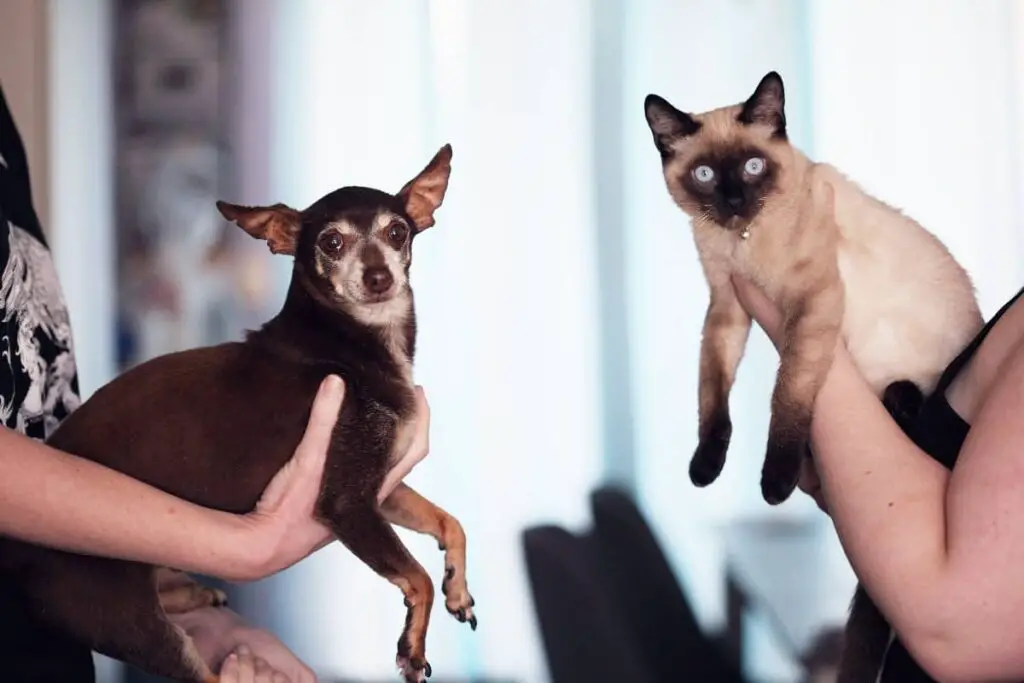
9) Chocolate
Just like chocolate can be fatal for dogs, it is also just as bad for cats. See, chocolate is certainly one of the foods that are poisonous for cats it contains things like ‘methylxanthines’ which can cause:
- high body temperature
- vomiting
- diarrhoea
- muscle tremors
- abnormal heart rhythm
- stomach pains
- …and even seizures.
The cocoa beans in chocolate also contain ’theobromine’ which is highly toxic and in large amounts, will be fatal.
So if you’re going to have sweet treats like chocolate – that’s fine. But be sure to keep it WELL CLEAR of your cat, to ensure they remain safe and healthy.
10) Milk & Dairy Products
It’s a common misconception that cats like dairy products, but it’s important to know that they’re really not good for them.
See, once a kitten is weaned from its mother, its body stops producing the enzymes necessary to digest the lactose in dairy foods.
Cat’s therefore become lactose intolerant and so giving them milk, cheese, butter (or anything like that) will cause stomach cramps, sickness and/or diarrhoea. (Even if you don’t notice it at the time.)
And I know, I know – cats will eat dairy products. In fact, they might even pester for it. (Which is why you may not see the harm in it.) But just like if you ate a bulk load of junk food, your body wouldn’t be thanking you for it, so it’s really not something they should eat.
This leads us onto our next (surprising!) food that cats shouldn’t eat…
11) Cat Milk
Now, there is milk that’s made specifically for cats. You may consider this to give them their dose of dairy…
Cat milk does indeed contain less lactose or none at all, however – their fat content is often just as high as any other milk your cat might want to drink! (Which by the way – is HIGH! You’d need to seriously exercise your cat if you want them to burn that off!)
Therefore, cat milk should only be provided as a – very occasional – treat, and remember – any dairy products as a whole, are not needed and are not helpful.
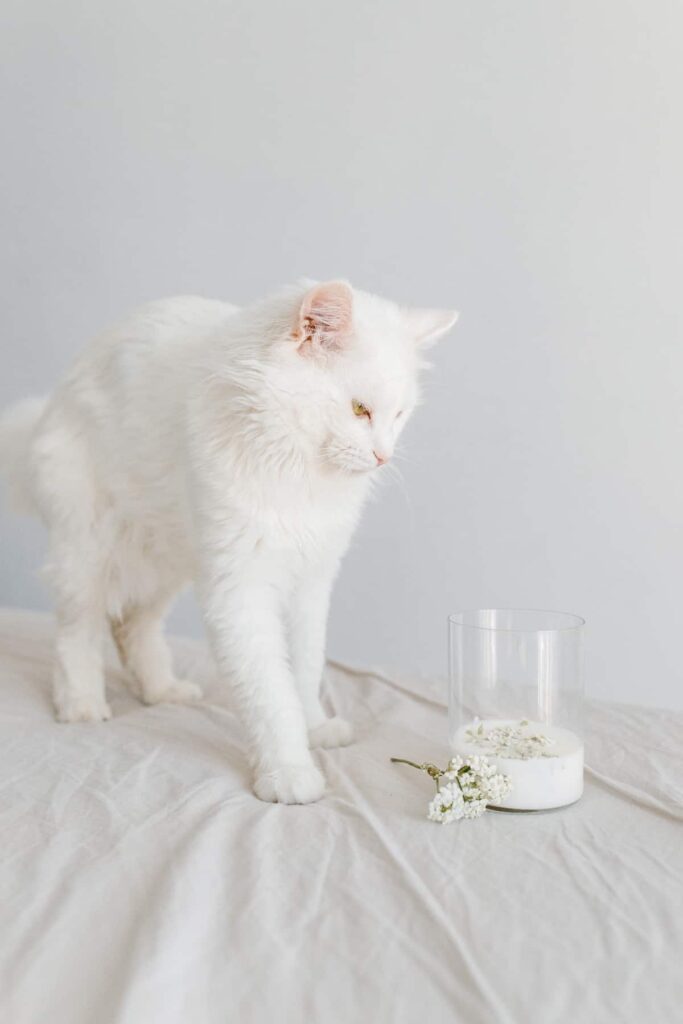
12) Some Fruits
Fruit is a bit of a funny one when it comes to cats. See, some fruits you’ll WANT to try with your cat; other fruits fall into the category of foods cats can’t eat… And this can be kind of scary. You might think, “well, what is and isn’t okay to give them?”
Well, as a whole – fruits like apples, bananas and pears, can provide helpful vitamins to your fury friend. In fact, these are to mention just a few.
Introducing new foods into your pet’s diet can cause upset stomach issues, such as vomiting or diarrhea, so – even with the fruits that are safe and helpful for your cat – always introduce only one new fruit or vegetable at a time to help you spot any health changes.
The fruits that are definitely NOT okay for your cat then, include: cherries, grapes and raisins.
Research is still being done to fully understand this one, but what we do know – is they’re toxic for cats and can cause severe kidney damage (leading to possible kidney failure.)
Other fruits cats can’t eat include citrus fruits like lemons, limes, and grapefruit, as these will (most definitely!) upset their stomach… Which is no surprise really. I mean, have you ever noticed them wince or run away when you’re peeling an orange even?!
So – in a nutshell – always be careful when it comes to fruits and know that some, are most definitely foods cats can’t eat!
13) Some Vegetables
On a similar note – there are certain vegetables that cats can and can’t eat.
For example, onions, garlic, leeks, scallions, shallots, and chives are particularly harmful to cats, causing gastrointestinal problems and even damage to red blood cells.
Foods containing these vegetables and herbs (like garlic bread for example) should also be kept well clear of your cat, so that they can’t accidentally “steal” some!
As a whole, when it comes to both fruits and vegetables – there can be some mixed reviews. Some say some are good for them, some say some are bad. So, regardless, when introducing anything new (having researched that it SHOULD be okay) – still do so with complete caution and get a second opinion from your vet beforehand.
That’s All For This One
So there we have it – 13 foods cats can’t eat, including the foods that are poisonous to cats (you’ll certainly want to steer well clear of!)
One final thing to remember is that if you are giving your cat a complete nutritionally sound diet, full of their OWN food, you don’t really need to add any extra foods or treats in… Especially if there’s a chance they might not be good for them. By planning their diet properly from the get-go, you’ll ensure they already have everything they need. (And you don’t need to worry about accidentally harming them with anything extra!)
We said it at the start, and we’ll say it again here – it’s better to be safe than sorry. So no matter how tempting it may be to give your furry friend an extra little “treat”, be aware that it may not actually be a treat that you’re giving them and it’s really not worth the risk.
Hope this has helped. Be sure to share it with your cat-loving friends to keep our cats, safe!
